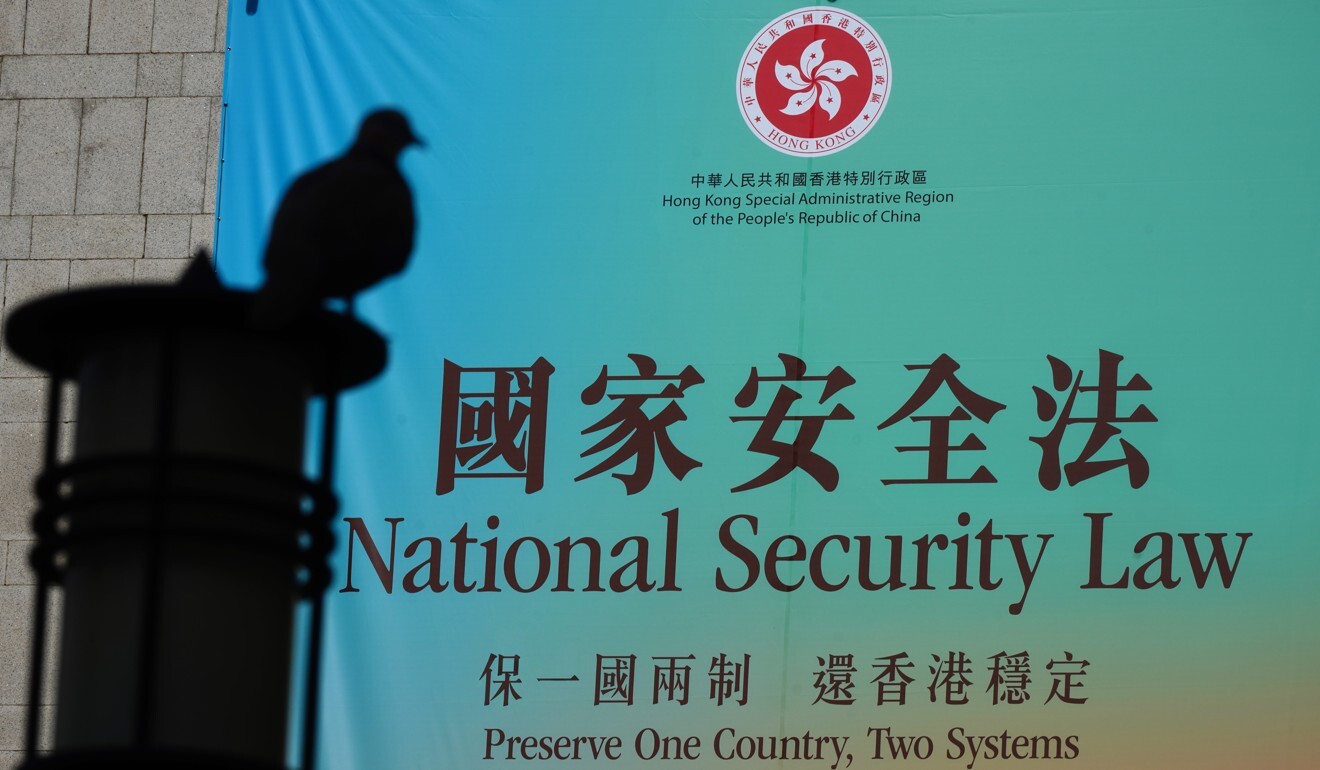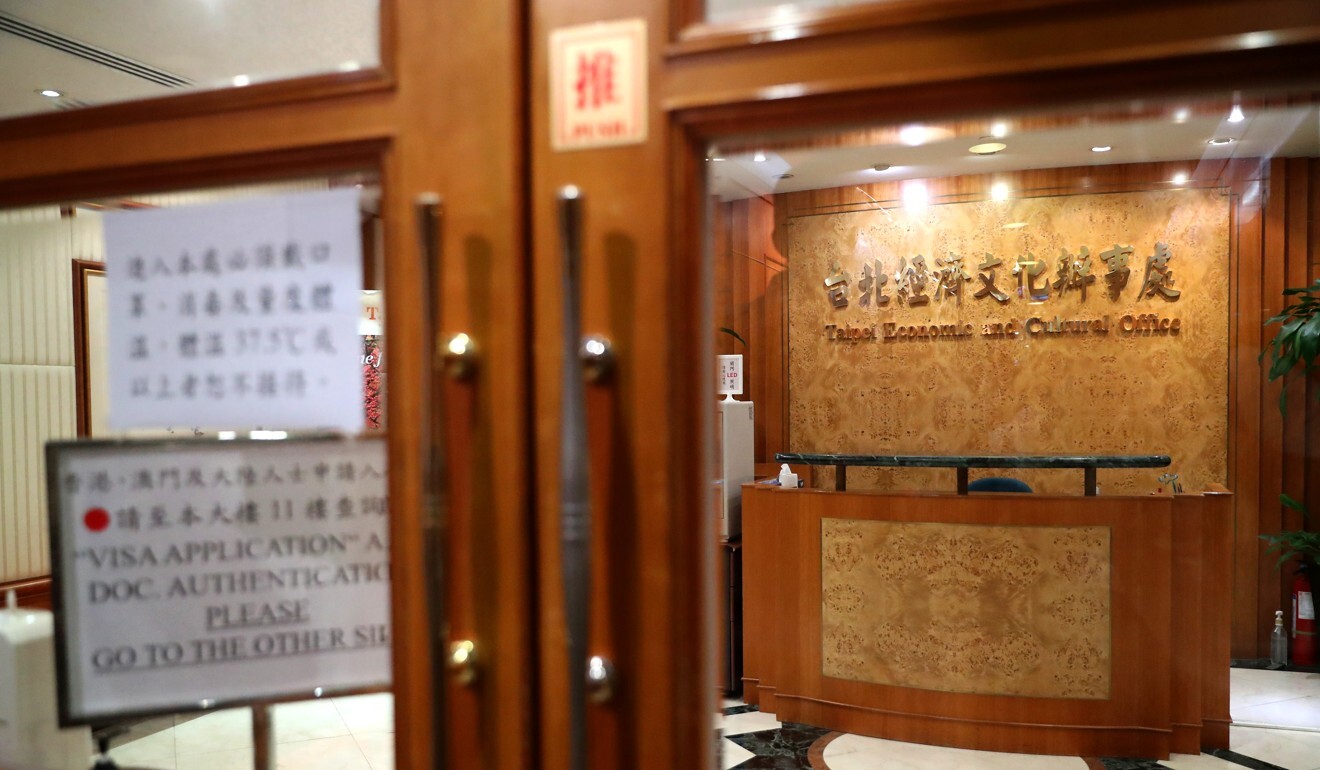
Taiwan fears Hong Kong national security law will leave representative office unable to function
- The island’s acting representative in the city has left after refusing to endorse the one-China principle and Taipei is concerned the squeeze will continue
- Taiwan insists it will not sign statements to comply with sweeping new security law, but fears it will hit the quasi-diplomatic mission’s operations

Taiwan fears that its representative office in Hong Kong will gradually become unable to function properly as it is squeezed by Beijing’s new national security law.
The island’s acting representative in the city Kao Ming-tsun and two colleagues were forced to leave the city after they refused to sign a statement “rigorously upholding the one-China principle” and agreeing to abide by Hong Kong law as a condition of having their work visas renewed.
Taiwan’s Mainland Affairs Council, which also supervises Hong Kong and Macau affairs, has admitted that Kao’s tenure has ended, but declined to confirm whether Kao was forced to leave because he refused to sign the statement.
“The stationing of our personnel in Hong Kong is in line with our job rotation [policy], and those posted [there] do their best to serve their positions steadfastly,” said Chiu Chui-cheng, the vice-president of the council.
He complained that the Hong Kong authorities had imposed “unnecessary obstacles” that went beyond the 2011 agreement signed by the two sides to establish the Taipei Economic and Cultural Office (Teco) in Hong Kong and Hong Kong Economic, Trade and Cultural Office in Taipei.
Kao’s return has left just one senior official in charge of Teco. The quasi-diplomatic mission, which previously operated under the guise of the Chung Hwa Travel Service, was established during the presidency of Ma Ying-jeou.
The office has been permitted to perform some consular functions such as issuing visas, but its staff have to apply for three-year work visas from the Hong Kong authorities to enter the city.

Ma, from the mainland friendly Kuomintang, adopted a policy of engagement with Beijing and recognised the “1992 consensus” – an understanding that both Taiwan and the mainland agree that there is only one China, but each can have its own definition of what that means.
But relations with the mainland have soured since Ma’s successor Tsai Ing-wen, of the independence-leaning Democratic Progressive Party, was elected president in 2016 and refused to accept the one-China principle.
This has also affected relations with the Hong Kong authorities, and it has become increasingly difficult for Taiwan to send representatives to its Hong Kong office.
Lu Chang-shui, who has been appointed to head Teco, has been waiting in vain for more than two years to get a green light from the city government for his posting. Kao, head of the liaison section, had been acting on his behalf until his permit expired recently.
The office is now running out of senior executives as only the head of the economic affairs section remains in Hong Kong while the positions of the rest of four other section chiefs have yet to be filled.
Teco is composed of the (consular) service section, liaison section, as well as economic, cultural and information sections.
Except for the economic section chief Ni Po-chia, other section chiefs have all returned to Taiwan after their three-year visas expired and no extensions or new appointments have been approved by the Hong Kong government.
In a briefing on Thursday, council chairman Chen Ming-tong complained of “political interference” from the Hong Kong authorities.
“The Hong Kong side should adhere to our bilateral agreements which protect each other’s institutions from political interference,” he said, adding actions like this would only damage the rights and interests of Teco in Hong Kong.
“We will take necessary and powerful countermeasures against this,” he said without further elaborating.
Asked if Teco could bow to pressure from Hong Kong to sign any political documents the city government needs in line with the national security law, Chen said there was no way Teco or Taiwan would do that.

The security legislation, which Beijing imposed on the city on June 30 targets acts of secession, subversion, terrorism and collusion with foreign forces to endanger national security.
It grants Hong Kong police sweeping powers and allows the city’s security chief to order political groups in Taiwan and elsewhere to provide information on the activities, personal details, assets, income and spending of an organisation in Hong Kong “in a prescribed manner within the specified period”.
Observers said with the contentious security law in place, the island’s ties with Hong Kong are facing even more uncertainty, and there is little Taiwan could do unless it wants to end its relations with the city once and for all.
As to the fate of Teco, Alexander Huang Chieh-cheng, a former Mainland Affairs Council vice-chairman and now a professor of strategic studies and international affairs at Tamkang University in Taipei, said there could be four scenarios the Taiwanese office could face.
“Teco could continue operating but with self-censorship by its personnel,” he said, referring to discussions of sensitive subjects.
He continued: “The functions and services of Teco could be minimised and reduced to functional ones – namely, cultural, business and education affairs – with no more consular and political services.”
He said that if the Hong Kong authorities continued to deny visas to personnel assigned by the Mainland Affairs Council it could “close down Teco indefinitely”.
Asked if Taiwan would really close down Teco, Huang said: “Taiwan will try everything it can to preserve and perform services to Taiwan citizens as well as our Hong Kong friends there.
“Based on my professional experience, Taiwan will not close Teco until the conditions become hopeless or too dangerous for our personnel.”
He said withdrawing Taiwan’s official representative office in Hong Kong would be “a huge setback to Taiwan-Hong Kong relations and cause a significant deterioration in relations across the Taiwan Strait.”
He said in addition to being more cautious when engaging Hong Kong pro-democracy advocates and organisations, Taiwanese officials should provide incentives and continue promoting people-to-people exchanges between Hong Kong and Taiwan.